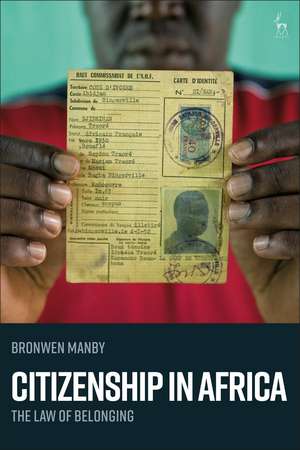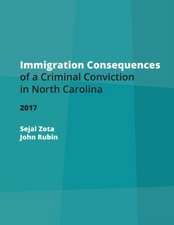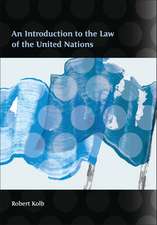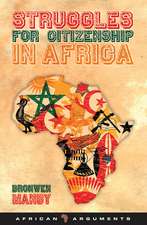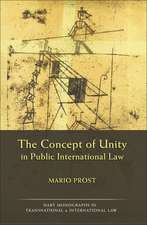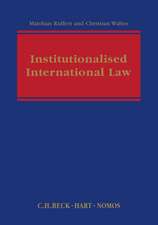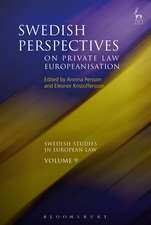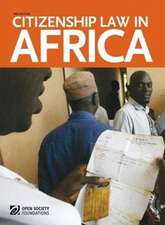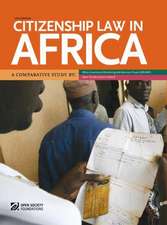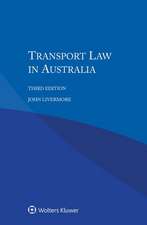Citizenship in Africa: The Law of Belonging
Autor Bronwen Manbyen Limba Engleză Paperback – 27 ian 2021
| Toate formatele și edițiile | Preț | Express |
|---|---|---|
| Paperback (1) | 357.07 lei 6-8 săpt. | |
| Bloomsbury Publishing – 27 ian 2021 | 357.07 lei 6-8 săpt. | |
| Hardback (1) | 720.63 lei 6-8 săpt. | |
| Bloomsbury Publishing – 28 noi 2018 | 720.63 lei 6-8 săpt. |
Preț: 357.07 lei
Preț vechi: 435.17 lei
-18% Nou
Puncte Express: 536
Preț estimativ în valută:
68.33€ • 73.06$ • 56.97£
68.33€ • 73.06$ • 56.97£
Carte tipărită la comandă
Livrare economică 17 aprilie-01 mai
Preluare comenzi: 021 569.72.76
Specificații
ISBN-13: 9781509944002
ISBN-10: 1509944001
Pagini: 416
Dimensiuni: 156 x 234 x 26 mm
Greutate: 0.58 kg
Editura: Bloomsbury Publishing
Colecția Hart Publishing
Locul publicării:London, United Kingdom
ISBN-10: 1509944001
Pagini: 416
Dimensiuni: 156 x 234 x 26 mm
Greutate: 0.58 kg
Editura: Bloomsbury Publishing
Colecția Hart Publishing
Locul publicării:London, United Kingdom
Caracteristici
Magisterial survey of nationality laws, drawing on comparative case studies from across the continent
Notă biografică
Bronwen Manby is a Consultant and Visiting Senior Fellow at the London School of Economics and Political Science, previously working for the Open Society Foundations and Human Rights Watch. She is the author of numerous publications on nationality and statelessness and in the field of human rights in Africa generally.
Cuprins
PART IINTRODUCTION1. International Law and the Right to a Nationality 1.1. What's in a Word: Citizenship or Nationality? 1.2. The Regulation of Nationality in International Law 1.3. The Content of Citizenship Rights 1.4. The Relevance of the Right to a Nationality in Africa PART IIEMPIRE TO INDEPENDENCE: THE INVENTION OF NATIONALITY IN AFRICA2. Membership in the Pre-Colonial Era 3. The European Colonial Period 3.1. British Territories 3.2. French Territories 3.3. Others 4. Transition to Independence 4.1. The Ottoman Empire 4.2. British Territories 4.3. French Territories 4.4. Others PART IIIAFRICAN NATIONALITY LAWS SINCE INDEPENDENCE5. Trends and Patterns in Nationality Law 5.1. Acquisition at Birth: The Balance of Jus Soli and Jus Sanguinis 5.2. Gender Equality 5.3. Dual Nationality 5.4. Naturalisation 5.5. Loss and Deprivation 5.6. Making Sense of Legal Amendments 6. Identification and Registration 6.1. Proof of Nationality: The Civil/ Common Law Divide 6.2. Civil Registration 6.3. Child Protection6.4. Identification and Nationality 6.5. The Relationship Between the Formal and the Informal PART IVCOUNTRY CASE STUDIES7. Who is a Native? 7.1. Dual Citizenship, Denationalisation and Disenfranchisementin Zimbabwe 7.2. The 'Lebanese' of Sierra Leone 7.3. 'Asians' and other 'others' in Kenya and Uganda 7.4. Côte d'Ivoire's War of Conjunctions: The 'and' and the 'or' 7.5. The Banyarwanda of Eastern Democratic Republic of Congo 7.6. Mauritania's Efforts to Enforce a 'Nation-State' 7.7. 'Indigeneity' in Nigeria: The Links Between Local and National 8. State Successions Since Independence 8.1. Eritrea/Ethiopia: State Succession and Mass Expulsion 8.2. Sudan and South Sudan 8.3. The Bakassi Peninsula 8.4. The Tebu and the 'Aouzou strip' between Chad and Libya 8.5. Other ICJ Rulings in Border Disputes 9. Access to Citizenship for Refugees 9.1. Former Liberian and Sierra Leonean Refugees in Guinea 9.2. Tanzania: A Unique Offer of Citizenship to Refugees 9.3. South Africa: The Dream Deferred PART VCONCLUSIONS10. The Importance of Nationality Law in Africa 10.1. Categories of the Excluded and Commonalities with other Regions 10.2. Patterns, Continuities, and Discontinuities in the Law 10.3. The Influence of International Law 10.4. The Instrumentalisation of Nationality Laws 10.5. The Unintended Consequences of the Initial Frameworks for Nationality Law 10.6. The Impact of Changes in Nationality Laws 10.7. Marginal Citizens: The Buffer Zone 10.8. The Importance of Recognised Nationality and the Impact of Statelessness 11. An Agenda for Research and Reform 11.1. Pathways to Citizenship 11.2. Resolving the Question of Theoretical other Nationalities 11.3. The Situation of Nomads 11.4. Bringing Naturalisation in from the Arbitrary Cold 11.5. The Role of Decentralised Decision-Making 11.6. The Importance of Subsidiary Legislation and Administrative Procedures 11.7. 'Legal identity' and New Technologies in Africa 11.8. Future Directions: Nationality in National and Continental Law
Recenzii
[T]his book presents a detailed description of the legal mechanisms of citizenship and their impact on the continent, but does so in tandem with a strong historical and political understanding of the context in which these mechanisms have evolved and operated. This is its strength: it will appeal to legal scholars who want to understand the detail of legal process, but has relevance to a much wider audience - an audience that will hopefully heed its call to action.
There is a growing literature within international human rights law about the right to nationality, but it is a topic that has received sparse attention from citizenship and nationality scholars. Bronwen Manby's Citizenship in Africa: The Law of Belonging makes an important contribution at the intersection of these two literatures. Through a series of historical case tudies, Manby offers important insights that support a robust right to nationality.
A book that will be recognised as a standard-setter in an emerging field of study . a sophisticated, comprehensive research monograph with multiple dimensions.
To call Manby's book comprehensive is an understatement; she covers practically every legal dimension of citizenship and nationality policy, with examples and vignettes from every country, over a span of centuries. Each page itself is not only packed with empirical detail, the footnotes themselves constitute an entirely separate and engaging counter-melody of thought exercises and a treasure trove of additional primary sources and secondary analysis. This is a reference book invaluable to scholars seeking to better understand the history and politics of particular countries, colonial legal legacies, and to situate Africa within the broader global context of nationality and citizenship regimes.
There is a growing literature within international human rights law about the right to nationality, but it is a topic that has received sparse attention from citizenship and nationality scholars. Bronwen Manby's Citizenship in Africa: The Law of Belonging makes an important contribution at the intersection of these two literatures. Through a series of historical case tudies, Manby offers important insights that support a robust right to nationality.
A book that will be recognised as a standard-setter in an emerging field of study . a sophisticated, comprehensive research monograph with multiple dimensions.
To call Manby's book comprehensive is an understatement; she covers practically every legal dimension of citizenship and nationality policy, with examples and vignettes from every country, over a span of centuries. Each page itself is not only packed with empirical detail, the footnotes themselves constitute an entirely separate and engaging counter-melody of thought exercises and a treasure trove of additional primary sources and secondary analysis. This is a reference book invaluable to scholars seeking to better understand the history and politics of particular countries, colonial legal legacies, and to situate Africa within the broader global context of nationality and citizenship regimes.
